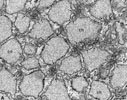


The Department of Energy’s Energy Sciences Network (ESnet), a high-speed network linking tens of thousands of researchers around the nation, was honored on April 14 with an Excellence.Gov award for its achievements in leveraging technology. The Excellence.Gov awards recognize the federal government’s best information technology (IT) projects. This year’s theme focused on how organizations use IT transparently to improve the public’s information gathering abilities, or an agency’s ability to deliver information to the public or a particular constituency. ESnet is headquartered at Berkeley Lab. More>
 In The News: The Membrane Metro
In The News: The Membrane Metro[Science Matters] Cells are nature's protein factories. They build enzymes, antibodies, and a host of other critical molecules on a nanoscale assembly line. Berkely Lab’s Randy Schekman has devoted his career to researching the intricate systems that pack and transport these proteins between organelles and beyond the cell walls. More>
 In The News: Habitat for Human Stem Cell
In The News: Habitat for Human Stem Cell[Science Matters] Scientists hope someday to be able to transplant stem cells into the body to repair injured nerve cells, regenerate diseased organs, and replace defective tissues. But stem cells are also prima donnas, tricky to keep alive in the lab and difficult to control. Berkeley Lab’s David Schaffer is developing ways to mimic their natural habitats and cultivate stem cells for tomorrow's medical therapies. More>
 The Lab’s Health Care Facilitator invites employees to a workshop entitled “Top Ways For Healthy Eating On A Budget.” It will be held on Wednesday April 22, from 10 to 11 a.m. in the lower Cafeteria Dining Room. The guest speaker is Elena Summer, with Weight Watchers Public Relations. She will teach simple strategies about eating well while keeping costs down, and offer new tips for your next visit to the grocery store.
The Lab’s Health Care Facilitator invites employees to a workshop entitled “Top Ways For Healthy Eating On A Budget.” It will be held on Wednesday April 22, from 10 to 11 a.m. in the lower Cafeteria Dining Room. The guest speaker is Elena Summer, with Weight Watchers Public Relations. She will teach simple strategies about eating well while keeping costs down, and offer new tips for your next visit to the grocery store.
 World of Science: Chu Out to Revitalize U.S. Industry and Save the World
World of Science: Chu Out to Revitalize U.S. Industry and Save the World[Newsweek] The Department of Energy is at the center of U.S. efforts to end our dependence on foreign oil, roll back climate change and create new jobs. Fareed Zakaria sat down last week with the department's new head, Nobel physicist Steven Chu, at Newsweek's Energy Independence 2020 Forum Luncheon to talk about smart grids, solar panels and more. More>
 World of Science: Ancient Diatoms Lead to New Technology for Solar Energy
World of Science: Ancient Diatoms Lead to New Technology for Solar Energy Engineers at Oregon State University have discovered a way to use an ancient life form to create one of the newest technologies for solar energy, in systems that may be surprisingly simple to build compared to existing silicon-based solar cells.The secret: diatoms.These tiny, single-celled marine life forms are the basis for much of the life in the oceans, but they also have rigid shells that can be used to create order in a natural way at the extraordinarily small level of nanotechnology. More>
A part of Lawrence Road near the Molecular Foundry will be limited to one lane from 11 a.m. to noon on Monday. Flaggers will direct traffic. Drivers are urged to use caution when traveling in this area.
Today at Berkeley Lab is produced by Public Affairs' Communications Department